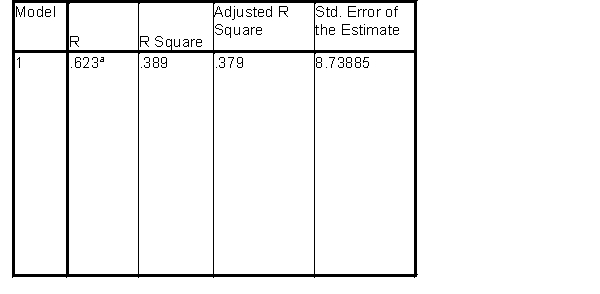Questions relate to the following output which is from a Standard Multiple Regression where the researchers wished to assess the contribution of stress and stigma to depression.
Model Summary
a.Predictors: Constant) , total of perceived stress, total of Stigma for neurological conditions
 ANOVAb
ANOVAb
 a.Predictors: Constant) , total of perceived stress, total of Stigma for neurological conditions
a.Predictors: Constant) , total of perceived stress, total of Stigma for neurological conditions
b.Dependent Variable: total of CES-D depression
Coefficientsa
 a.Dependent Variable: total of CES-D depression
a.Dependent Variable: total of CES-D depression
-Stress and stigma together predicted depression
A) extremely well, accounting for approximately 62% of the variation in depression scores
B) very poorly, accounting for approximately 9% of the variation in depression scores
C) well, accounting for approximately 38% of the variation in depression scores
D) none of the above
Correct Answer:
Verified
Q1: Questions relate to the following output which
Q2: In a multiple regression analysis which of
Q3: Assume you have carried out a Standard
Q4: When you look at the individual results
Q6: If, for a multiple regression, you have
Q7: Questions relate to the following output which
Q8: Tabachnick and Fidell 2009) have a formula
Q9: Questions relate to the following output which
Q10: Which of those below allows us to
Unlock this Answer For Free Now!
View this answer and more for free by performing one of the following actions

Scan the QR code to install the App and get 2 free unlocks

Unlock quizzes for free by uploading documents